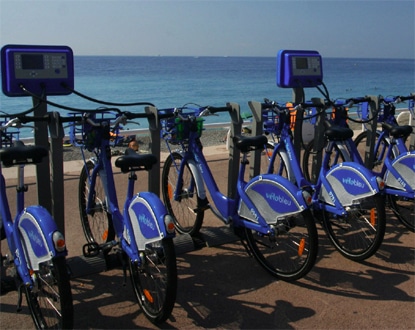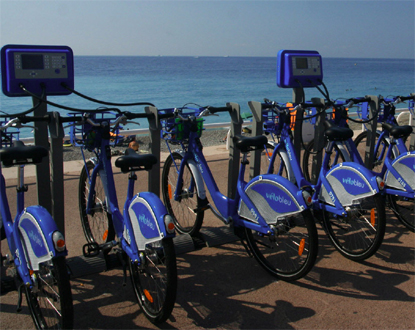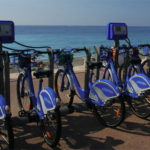As the city of Nice will host the next Congress of the Club of Cycling Cities and Territories in 2013, Jean-Marie DARMIAN, president of the Club of Cycling Cities and Territories, along with all the members of the Club’s board, have presented 10 proposals to make cycling an anti-crisis remedy.
The prospect of a comprehensive action plan encourages prioritizing measures that, at the state level, would have a significant impact as they bolster the already considerable efforts of local authorities.
 Therefore, in 2011, with the very real threat of an economic recession detrimental to already vulnerable people, economic incentives and emphasis on cycling in daily mobility—for work or school—should be highlighted as tools for social cohesion.
Therefore, in 2011, with the very real threat of an economic recession detrimental to already vulnerable people, economic incentives and emphasis on cycling in daily mobility—for work or school—should be highlighted as tools for social cohesion.
Finally, this national action plan project requires, for the Club, the confirmation of the position of Inter-ministerial Coordinator for the development of cycling use, the strengthening of its mission, and especially the creation of a mission structure to oversee the implementation of the adopted measures.
–For territorial cohesion
1. Allocating 10% of the national roads and highways budget for the development of cycling routes.
Cycling infrastructures do not require a large budget, but the delay in their development hinders their progress, especially in the suburban areas of major cities. It’s essential to address the disruptions caused by railways, major roads, and generally the inhospitable nature of roads in the suburbs, and to support the creation of some initial “cycling highways” and structural routes in major cities.
2. The signposting of major cycling routes and greenways
–For quality of life
- The revival of the “Street Code” initiative
The initiative launched in April 2006, which led to significant regulatory measures by mid-2008, is currently stalled. The goal is to adopt the measures validated over the past two years and to undertake new projects and communication actions related to these developments.
4. The implementation of an ambitious parking development plan
This action unfolds in existing collective housing (bike garages, boxes, on-street parking…), in public facilities, and in train stations, notably with the ANRU by systematically introducing bike facilities in urban renewal operations.
Partners: SNCF, ANRU, USH
5. The rollout of the bike marking system nationwide to combat theft (Bicycode system managed by the FUB – Federation of French Bicycle Users)
6. An annual communication campaign on the theme “Everyday cycling is good for your health”
The health benefits of regular cycling are considerable, and in terms of healthcare savings, the current cycling level of around 3% already represents a saving of 5.6 billion euros annually in healthcare costs. Increasing the level to 12-15% by 2020 (the current level of many European cities) could generate a 15.4 billion euro savings annually.
Partner: Ministry of Health
7. A nationwide deployment of cycling education initiatives often initiated in partnership by associations and local communities.
Funding to strengthen the established bike schools is essential for sustaining and developing these initiatives.
Partner: Ministry of National Education
–For social cohesion
8. A program for the development of cycling among employees.
The implementation of the French program “Cycle to Work” (proposed by the Club in April 2011) including tax exemptions for companies that provide bikes to employees (free loan or with purchase option, purchasing center…) would also support the development of the bike industry, while also offering public health and ecological benefits.
Partners: ADEME, National Council of Cycle Professions
9. A cycling mileage allowance
Employer participation in commuting costs, based on the Belgian model (0.21 euros/km, possibly combined with public transport allowance) exempt from social charges and non-taxable for the employee.
10. The citizen bike: a large communication campaign!
Cycling brings new balances, a new sharing of public space, and a different way of producing information, which is also more widely shared. It allows freedom and equality because it is both individual and collective, specific and public, autonomous and connected to other mobilities. The Club proposes that this citizen bike theme serves as the foundation for a major communication campaign in favor of cycling development, relying notably on the revival of the street code initiative, the Grenelle commitments, and the goals of the Kyoto agreements.



